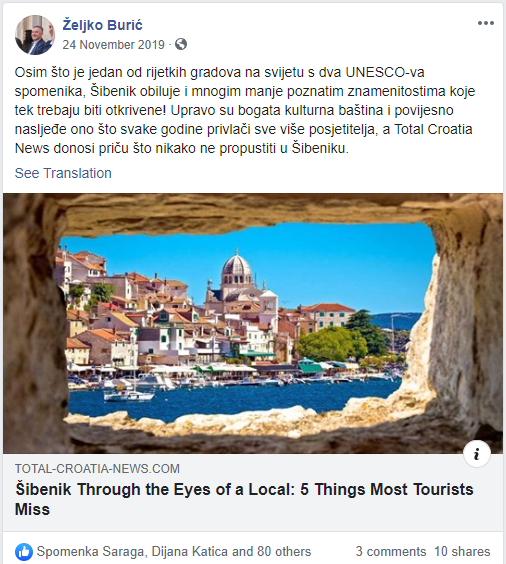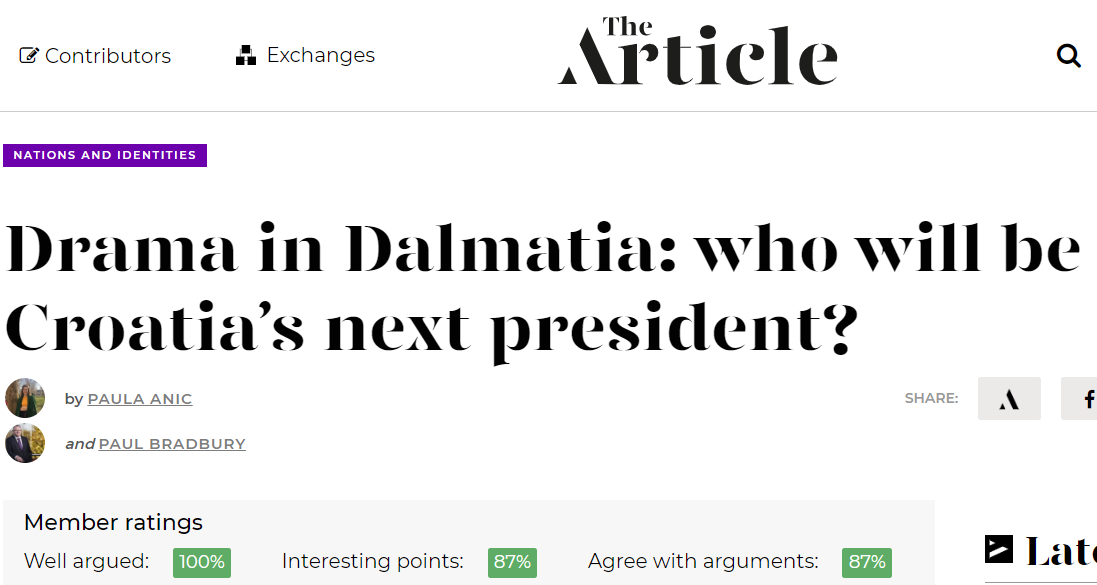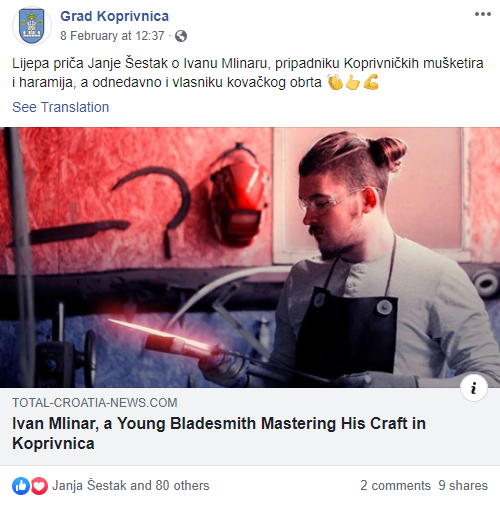Trogir, Where UNESCO Meets Game of Thrones and the Original Zinfandel
February 14, 2020 - Where to go to maximise the number of experiences in one place in Dalmatia? The case for Trogir.
Tourism is changing, and people these days seem to want to get the most out of a holiday. With the Instagram god to feed, the days of sitting on one beach for a fortnight are becoming rarer.
But sometimes you don't have to keep from place to place to enjoy unbelievable experiences on a daily basis.
Take Trogir for example - a destination which has SO much to offer, but which is often overlooked in favour of its bigger neighbour, Split.
I was in Trogir earlier this week, and my very fun day included a long overdue return visit to fabulous Vina Kairos, high in the hills over the UNESCO World Heritage Site of the old town of Trogir. It was more than four years since my first visit, when we featured Kairos and its enigmatic and innovative winemaker, Ljubo Jelacic, who is busy restoring the traditions of the birthplace of Zinfandel in the region where the iconic California grape variety was born. You can read about that first visit and a presentation of Kairos here.
As I surveyed the magnificent view in the February wind, I was struck not only by its beauty, but also about the wealth of fantastic things so close to each other. The birthplace of the original Zinfandel for wine lovers (with plenty more vineyards to visit in nearby Kastela. The view included views of no less than two UNESCO World Heritage Sites worthy of a visit (Trogir and Diocletian's Palace in Split - perhaps three if your vision was good enough to take in the Stari Grad Plain on Hvar), and Game of Thrones film locations in Kastela and Split.
The Kairos vineyard is GORGEOUS - here it is with a little more life on the vines. The Kairos vineyard is a great place to take in so much of the magic of Dalmatia, while enjoying local specialities and indigenous local grape varieties.
And then wander around the historic old town, which has an incredible amount of hertiage packed into its stone walled town.
Here, for example, is arguably the prettiest square in Dalmatia, the main square in Trogir.
And all this magic - and more - is just a few minutes from Split Airport, so accessibility is among its many attractions. Indeed, as we wrote recently, the accessibility and range of fantastic attractions in Trogir makes it the ideal start and finish of a holiday in Dalmatia, especially for those holidaying on an island. No last-minute ferry stress to take into consideration. Learn more about why the town is the perfect start and finish to a Dalmatian island holiday.
USA Ambassador Kohorst Clarifies 2020 Croatian Visa Waiver (VIDEO INTERVIEW)
According to Croatian Foreign and European Affairs Minister Gordan Grlić Radman, the United States (USA) planned to waive visas for Croatian citizens by the end of 2020 when the two countries sign a Double Taxation Treaty. While US Ambassador Robert Kohorst backed the 2020 timeline in yesterday's interview, he also emphasized that Croatia has not yet met all the conditions. And an inside source has confirmed that a Double Taxation Treaty is still 3 to 4 years away.
USA Visa Waiver Contingent on Refusal Rate Reduction: UPDATE
In an interview with Paul Bradbury of Total Croatia News yesterday, February 19, 2020; US Ambassador Robert Kohorst commented on Grlić Radman's claim that Croatia has fulfilled the conditions for the visa waiver program.
"We expect that there is a very good chance that Croatia will qualify for the Visa Waiver Program in 2020, but there are some things that need to be completed yet. Both, you get the refusal rate below 3%, which is calculated on September 30. So, it's starting to look like they'll achieve that goal, but it's still subject to what happens in terms of people applying for visas," he explained.
"The second one is that there is about four or five documents that need to be with the Department of Homeland Security. Those enrollment processes: Croatia is working hard on them. We expect them to be completed but they are not done yet. So, he (Croatian Foreign and European Affairs Minister Gordan Grlić Radman) wasn't wrong in terms of expecting to get it done, but there is still some work to be done," he concluded.
USA Croatia Double Taxation Treaty Not Expected in 2020: UPDATE
According to an inside source, the USA Croatia Double Taxation Treaty will not be signed in 2020 and is likely 3 to 4 years away under the best circumstances. A Double Taxation Treaty portfolio has not yet been created by the US Treasury Department. After the portfolio has been created, it is a 2 year process to prepare the DTT Treaty for signature by both countries. Then it is sent to the US Senate for approval.
There are currently 30 countries ahead of Croatia on the USA DTT priority list.
Croatia Foreign Minister Claimed Visa Waivers, Double Taxation Treaty for 2020
"We have fulfilled all (conditions) and this is now just a matter of the exact time. It is in the interest of both Croatian and American businessmen," Grlić Radman told reporters on February 14, 2020. He had met with US Secretary of State Mike Pompeo ahead of the start of the Munich Security Conference, the world's leading forum for discussing international security policy.
Croatia, Romania, Bulgaria and Cyprus are currently the only EU members for which the US has not yet waived visas. Citizens of Poland were exempted from the United States visa requirement at the end of 2019 according to Index on February 14, 2020.
After the meeting with Pompeo, Grlić Radman had said that the visa waivers and double taxation agreement would be implemented by the end of this year.
Croatia Troop Withdrawal from Afghanistan?
Croatia and the US are NATO allies and cooperate closely in peacekeeping operations in Afghanistan, Iraq, Kosovo, Poland and the Baltic States.
Asked if Croatia, like the US, would withdraw its forces from Afghanistan; the minister replied that Zagreb would coordinate an eventual troop withdrawal with Washington.
"It is a matter for the two countries' defense ministries, but we have reaffirmed that we will coordinate our actions. Croatia defends its interests through NATO and UN membership," he added.
Kiowa Helicopter Crash Discussed With Pompeo
Without going into detail, he indicated that he had spoken with Pompeo briefly about the acquisition of fighter jets and the recent Kiowa helicopter crash near Zablace. The USA had donated that aircraft to Croatia.
Grlić Radman will also meet with Iranian Foreign Minister Mohammad Javad Zarif later on Friday.
"Croatia insists on respect for international law ... and we are doing everything we can to urge Iran to strictly adhere to the nuclear deal," said the senior Croatian diplomat, the country which currently holds the six-month EU presidency.
Follow our Politics page to keep updated on the upcoming USA visa requirement waiver for Croatian citizens.
Brand New Croatian Drone Expected to Make Debut on Market in 2021
The Aeronautical Association of Split has linked the knowledge and experience of several generations of students, resulting in the Vector VX-3, the brand new Croatian drone.
As Poslovni Dnevnik/Darko Bicak writes on the 14th of February, 2020, what entrepreneur Mate Rimac is to Croatian cars is what Alpha Sagittarius from Split could well be to the world of the Croatian drone.
For many years now, Professor Branko Klarin has been gathering students at the Faculty of Electrical Engineering, Mechanical Engineering and Naval Architecture (FESB) in Split. These are students of aeronautics for whom he has made his laboratory available for both research and ''play''. But as that generation left college, their collective knowledge of aeronautics was lost with them, and then new students started from scratch.
Because of this, the FESB Association - the Aerotechnical Association of Split (AUS) - was founded a year ago, which has succeeded in bringing together the knowledge and experience of several generations of students, which in turn has resulted in the Vector VX-3 Croatian drone project.
These students from Split have won a number of awards here in Croatia and across Europe with their impressive Croatian drone project, and have recently returned from the United States where they were at the renowned AUVSI SUAS Aeronautical Student Competition, traditionally held at the Naval Base in Maryland. They left behind them fierce competition from the likes of Harvard, Penn State and Berkeley, and were the most successful university in Europe.
As explained by Đani Vrsalović, one of the former students of FESB and one of the initiators of the founding of AUS, the interest of potential partners and investors was so great after their appearance in the USA that their work outgrew the possibilities of the association and they had to register as a commercial company .
Given the fact that Vrsalović himself already had a registered company, Alpha Sagittarius, primarily engaged in shipping and tourism, in early 2019 it was decided for that company to become the basis for the development of a commercial Croatian drone development project in which Vrsalović is the majority owner and the other participants are partners. The drone, weighing about 5.5 kilograms, is expected to hit the market by early 2021, and although it's too early to talk about prices, estimates are that it should range from the 60,000 euro mark upwards.
''Although the drone is most commonly referred to as a multirotor, which rises and is managed by its four propellers, much like a helicopter, this one involves a fixed torso and wings. This is an innovative modular design, and we've been recognised in the US, which allows for the drone to be adapted to the needs of its users,'' Vrsalović pointed out. It is, he added, a very serious tool that will receive even better quality features and software throughout the course of 2020 that will boast elements of artificial intelligence.
"We expect that its primary function will be in search and rescue operations at sea and in the mountains. It will be optimised for the energy control of transmission lines, pipelines or wind power plants, etc. With the software we develop, it will have the ability to perform operations without problems and to detect problems by default. It will have autonomy of a maximum of three hours and that will be sufficient to make an emergency delivery, such as blood plasma or medication, from Split to Vis, and then return - they will be able to carry cargo weighing up to about 1.5 kilograms,'' explained Vrsalović.
So far, the company employs four people, with three more who work occasionally and they have a number of partner companies. "This is almost entirely a Croatian project - of course we have to buy computers and cameras from abroad because we can't produce them here in Croatia. But everything else, from the composite materials and communication systems, to the software and more, is being developed in Croatia. While we were developing the project within the association, Rimac worked on the composite materials for us.
But when both of us became serious players, we no longer had the capacity to do that, so we found a new partner in the Brzoglas Kaštela company, and our communication equipment is being developed by Stratowave - Connect in Zagreb,'' he noted.
So far, 1.5 million kuna has been invested in the project, of which just over one million comes from European Union (EU) funds. Although they don't plan for these Croatian drones to be used for military purposes just yet, Vrsalović did note that this is the second step that he doesn't want to talk about in more detail just yet, and will set that subject aside until they perfect the drone in its first step and its commercial uses.
"The military has special NATO standards that imply much more demanding and much more expensive equipment. This greatly raises the cost of development, as well as the final cost of such a drone. We're thinking about it, but for now, let's just stick with what we're doing,'' he said. He believes that Alpha Sagittarius has great opportunities for development because drone technology in Europe is far behind the US and some other countries, and that they can make a lot of sense with their ideas and knowledge in the segment of commercial and then military drones.
The turning point for the organisation to start establishing a commercial company was the situation from the AUVSI SUAS competition in the US, where members of the association competed, and where their Vector VX-3 project drew an enormous amount of interest.
Make sure to follow our dedicated business and Made in Croatia pages for much more.
The Croatian Connection Inside the Luxury Oscars $225,000 Gift Bag
February 14, 2020 - How to overcome the pain of coming second at the Oscars? A luxury Croatian product is just one of the consolation prizes to take away the pain.
There are consolation prizes, and there are consolation prizes.
Being nominated for the Oscars must be the pinnacle of any acting career, and coming second is undoubtedly a huge disappointment, but it seems that nobody goes home emptyhanded.
The actual Oscar statuette (also with its own Croatian connection) costs in the region of $400 to make, but every winner and runner up this year received a gift bag worth an astonishing $225,000.
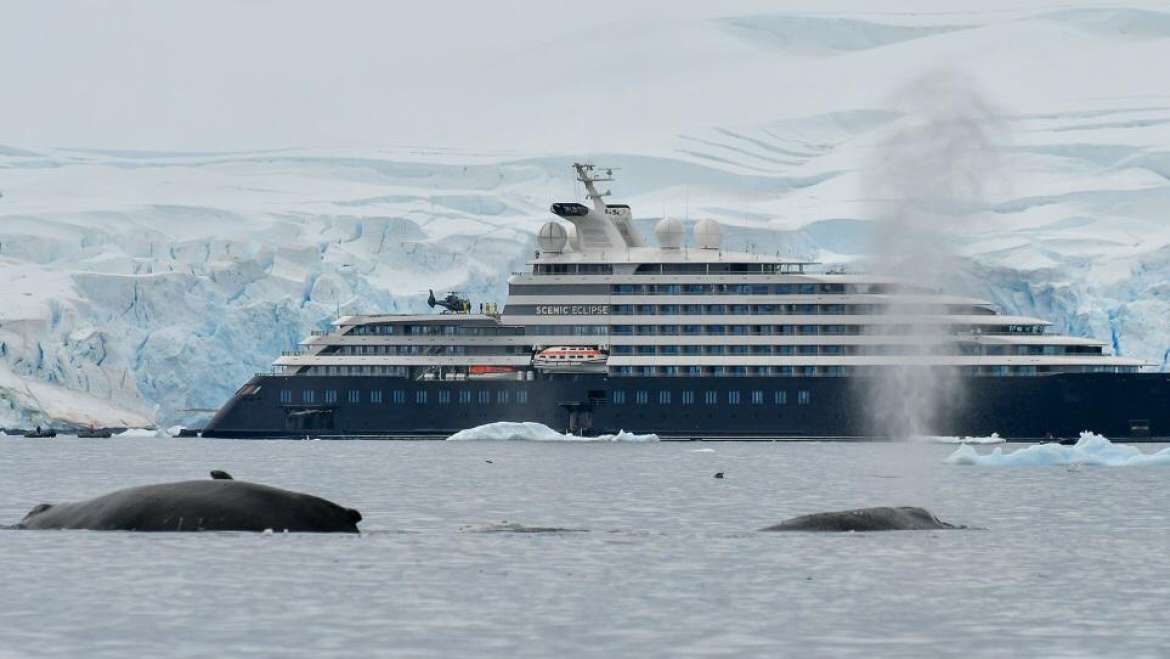
And that bag included a gift that was made in Croatia - could you imagine a better holiday to get away from the world and getting over the disappointment of coming second?
The nominees also receive vouchers to redeem the big-ticket items, such as a 12-day cruise on the Scenic Eclipse, a yacht for 220 guests, with butler service, two helicopters and a spa. (Dame Helen Mirren is actually the “godmother” of the Scenic Eclipse.) The expedition, provided by Scenic Luxury Cruises & Tours, is valued at $78,190; it is the most extravagant gift in Distinctive Assets’ history. Destinations include Antarctica and the Mediterranean. For intrepid guests, there is also a trip on a submarine capable of diving 1,000 feet.
To read the full Forbes article, click here.
The amazing gift is not the only connection between Scenic Eclipse and the Oscars. As mentioned above by Forbes, Dame Helen Mirren is the official godmother of the luxury polar discovery yacht, and her distinguished acting career has also included an Oscar for Best Actress in 'The Queen'. Check out the famous British actress in her godmother role on Scenic Eclipse, below.
As recently reported on TCN, Scenic Eclipse is a 200-million-euro luxury polar discovery yacht, which was built in Pula. It is the first of its type and opens up a completely new frontier in luxury tourism, taking its guests to parts of the world that larger vessels can only dream about. And the exciting news for Croatia's embattled shipbuilding industry, is that the Scenic owners are in talks with the Croatian government to build five more ships in Rijeka, in a 900-mllion-euro deal which could bring job security - and new jobs - to Rijeka's shipyard.
Just one more example of Croatian excellence on the global stage. To learn more about exciting things being produced in Croatia, follow our dedicated Made in Croatia section.
First Split Marathon Begins Sunday with 4,000 Participants from Over 40 Countries
February 14, 2020 - The Split half marathon will celebrate 20 years this year, while the Split marathon will run for the first time.
Dalmatinski Portal reports that the program, which is held from February 21 to February 23, will have its main event on Sunday, when the 42-kilometer Riva marathon begins at nine in the morning. A record number of 4,000 participants from more than 40 countries is expected. The marathon will also include the relay made up of Mladen Bartulovic, Dalibor Nincevic, Jakov Vetma, and Andro Krstulovic Opara, the leaders of Podstrana, Solin, Klis and Split.
“After three years of preparations, Split and the whole region will receive a full marathon. It is the result of the meticulous and dedicated work of the volunteer group that works throughout the year. We are ready, and as far as the race is concerned, it could start tomorrow. The marathon sold out two months ago, we have 900 competitors, making us the largest marathon in Croatia so far. In addition to the marathon, we have a half marathon race where we have 2000 competitors.
Starting this year, we moved the 5k race to the day before. We have strong names from Kenya and Ethiopia, and we expect a fairly good race. Split is a beautiful city, and the trail is beautiful. I have run numerous marathons, but the split track is still the most beautiful. A Japanese woman who is 72 is also arriving, and Split will be the 100th marathon in her career, with the addition that she started running 15 years ago,” said Organizing Committee President Kristijan Sindik.
Organizing Committee Deputy Chairman Sandra Russo Zelenovic was surprised by the large number of journalists at the press conference.
“I am incredibly happy to see you in such great numbers. This is not just a sporting event. The whole event could not be organized without the support of the City, the County, and the Tourist Board. The event also includes the Sports Fair, which will be held at Gripe from February 21-22. Within the Fair, there will be a workshop on healthy eating and injury prevention. There will also be a hand-wrestling competition. The Split Marathon has had a humanitarian element for years. This year, we will be raising funds with Dina Levacic to buy educational supplies for the Perla Association.”
The director of the Split Tourist Board, Alijana Vukšić, emphasized the importance of marathons for Split tourism in the preseason.
“It is my pleasure to have worked together for many years. Last year, over ten thousand overnight stays were realized in six days, and this year we expect this number to be even higher. Split deserves this kind of event. Our guests are very modern and all are willing to pay for healthy food and healthy living. This is an opportunity for them to keep their habits while on their journey and come back to us. It is also important to emphasize that such guests do not come alone and spend more,” she said.
The director of the Split and Dalmatia County Tourist Board, Josko Stella, emphasized the importance of this event for the entire county.
“The marketing effect of this marathon is extremely important to us and we have supported it from the very beginning, and we will support it in the future.”
Jakov Vetma, Mayor of Klis Municipality, is one of the participants in the relay marathon. The first change is run by Mladen Bartulovic, from the Riva to Vranjic. The Mayor of Solin, Dalibor Nincevic, who runs from Vranjic to Lora, will take over the baton there. At the western exit will be Jacob Vetma, who will run across Poljud and Marjan, and at Banovina will be Andro Krstulović Opara, who will take the final leg.
“I’m here as one of the participants. Together with Mayor Opara, Dalibor Nincevic and Mladen Bartulovic, we plan to run this marathon,” Vetma said.
Dalibor Nincevic, Mayor of Solin, will also be part of this sports and cultural story.
“The marathon section will pass through the town of Solin, thus connecting it with Split. I am pleased that the participants of the marathon, apart from Split, will have the opportunity to get to know the beauties of Solin and Vranjic,” said Nincevic, and was inspired by Mayor Andro Krstulović Opara.
“I run the last leg of the relay. It's about 12 kilometers and the handoff will be right next to Banovina. A large number of enthusiasts have brought this attribute to the city of Split, which proves that we are one of the sportiest cities in Split. Where in the world do you have a route that goes from Diocletian's Palace to Solin, the 'little Venice', via Lora, Marjan, the port, Bacvice, Žnjan, Duilovo and back to the Palace?
The marathon season begins in Split. I hope that in the future, this marathon will be one of the largest in this part of Europe. I would ask the citizens to be patient because we will have to close certain lanes,” said Opara Krstulovic.
The head of the Department for Tourism and Maritime Affairs, Stipe Čogelj, stressed the importance of this event for the entire County.
“The sportiest city in the world has earned this marathon. This is a capital event that the County supports every year. The figures themselves show how much this organization deserves our support. We can do great things with the synergy of all cities and counties,” concluded Čogelj.
To read more about sport in Croatia, follow TCN's dedicated page.
Estonia, Leading European Digitization Path, A Great Role Model for E-Balkans
February 14, 2020 - So what is a Venezuelan living in Varazdin doing travelling to Budapest to collect an e-residency from the Estonian Embassy? Meet a role model for e-Balkans.
There's so much to say about Estonia. The Baltic nation is home to 1.3M citizens, and producing the highest amount of unicorns per capita (Bolt, TransferWise, Skype, and Playtech). It offers a comfortable 20% income tax flat-rate for private entrepreneurs and corporations, and last year 98% of its population declared their taxes electronically in less than 3 minutes.
Also, they started to implement Blockchain for hash-linked timestamps in their systems nine years ago. Yup! That's 2011. For reference, that's the year Steve Jobs died, and the then 3-year-old bitcoin closed at $4.72 on December 31st.
Today, however, we will focus on their e-residency program, launched in 2014 by the e-nation as part of their Country-as-a-Service plan.
Last Thursday, February 6th of 2020, I traveled to the Estonian Embassy to Hungary in Budapest, to receive my "e-residency kit" from the hands of the Consul Kenneth Kopammes.
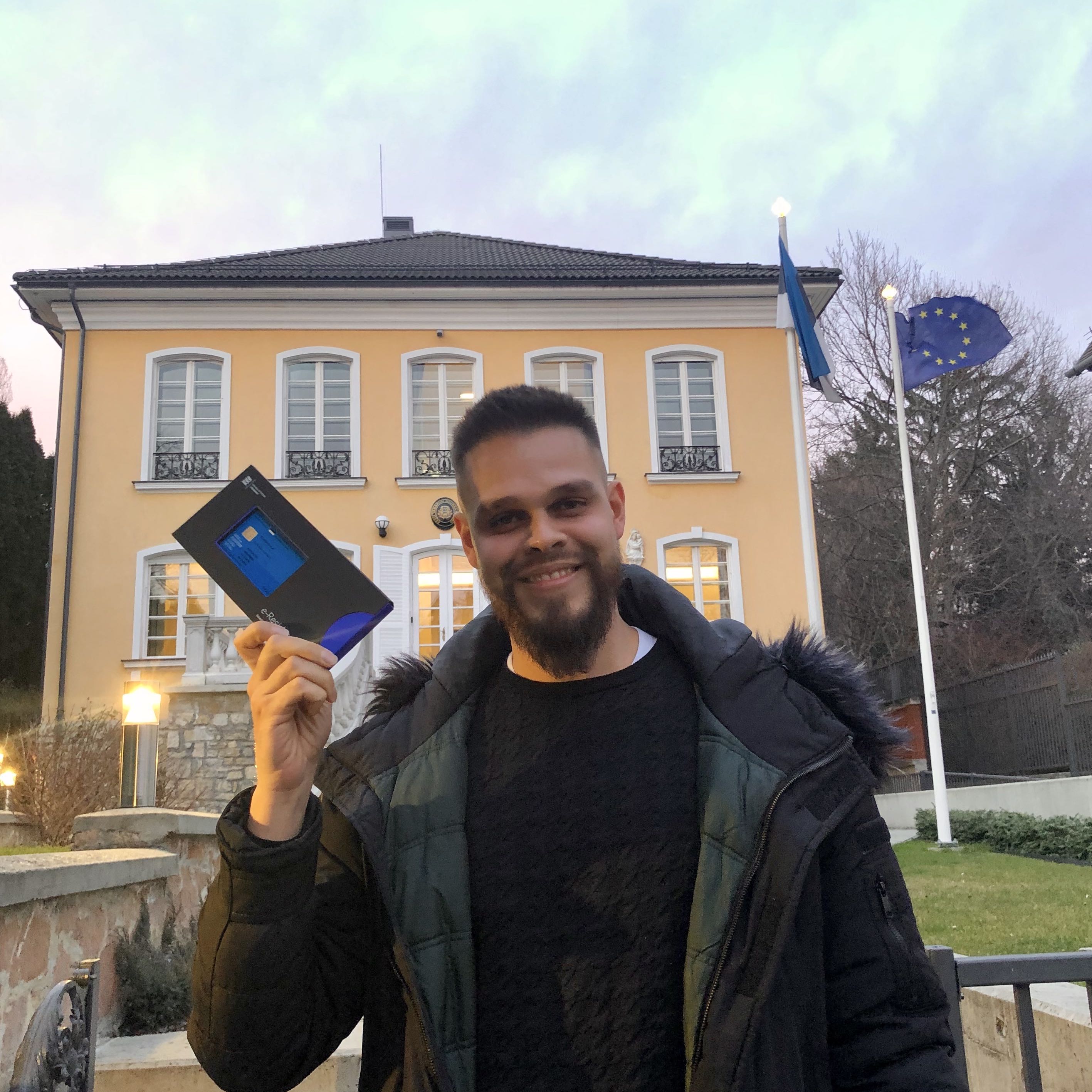
The e-residency Kit includes a residency card (without profile picture) and a USB-card-reader. With it, I'll be able to sign electronically and access any of the services available
The experience was eye-opening, and this although I was very aware that giving my digital prints and receiving my e-residency card would be the first and last time I'd need to visit any Estonian government building, physically.
To better understand my excitement and motivations, you first need to know that this 2020 is the 17th anniversary of my arrival to Europe. Also, that as of today, I still hold a Venezuelan passport, exclusively.
I left Venezuela in 2003, or better said, as soon as my age made it legally possible for me to migrate. Today, I'm a self-proclaimed "Citizen of the World" who lived, studied, and worked in Venezuela, Germany, France, Spain, Denmark, Malta, and Croatia, visiting an even more considerable amount of jurisdictions.
In short, you can consider me a Connoisseur of Bureaucracy, a Sommelier of Visas and Residencies, and a European Authority on the ancient art of requiring Stamps and Permits to earn a living.
With this in mind, picture my reaction as I learned there was a Schengen state of the European Union, allowing a Venezuelan to open a business online and in a few hours. First, I thought: "What am I missing?" and immediately after reading into it on their dedicated service portal, I knew: "I have to try it out!"
One needs to become accustomed to the digital state experience, even a Human-Computer interaction futurist like me. By the end of 2019, Estonia had 62,000 registered e-residents and 10,000 e-resident companies. I knew this, of course! Like I also knew that 99% of their state services are online, and regardless, although all the cards were on the table, it shocked me to learn about the Embassy's staff count and the efficiency of their operations.
Here is the workforce I was expecting to see at the Embassy to complete the process of my e-residency and interviewing the Consul: Entrance staff, service-desk Staff, e-residency processing staff, PR staff, the Consul's PA, and finally, the Consul.
The Staff I interacted with: The Consul.
And who opened the front door? You wonder. Who let you into the processing room? Who sat in front of you and typed on the Keyboard Gustavo?
Well, all doors are remote-controlled, that was easy. And like any other e-resident, I had an appointment previously confirmed via e-mail, so I was the only person in the room that day. The process took at most 3 minutes, a quick preview of the time I'll need for tax declarations. And the person guiding me throughout the steps, with a broad smile, processing my data, and assisting me in scanning my fingerprints was Kenneth, the Consul, as he pointed out me when I asked him about the agreed interview ahead.
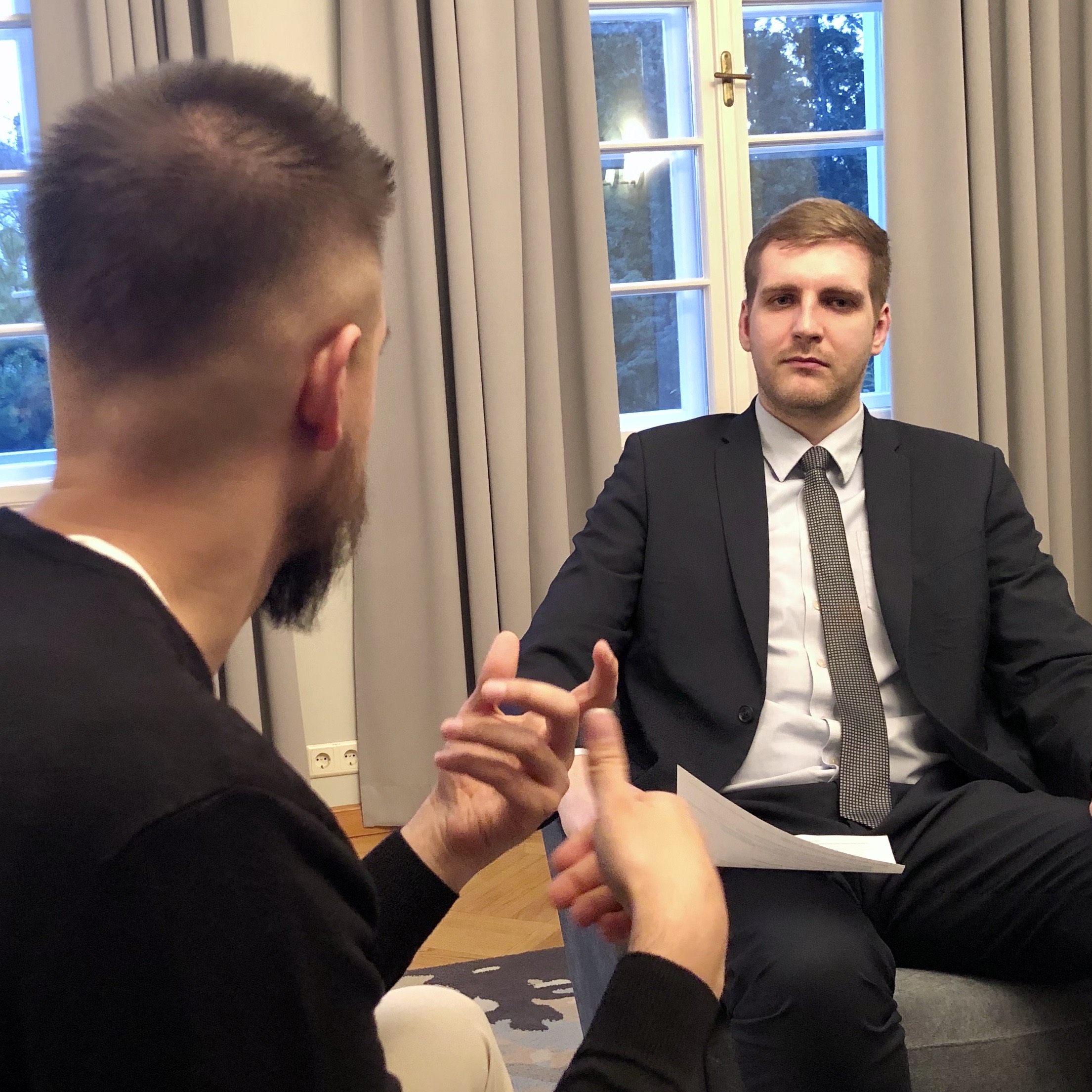
What an honour, I thought to myself, when I learned that Mr. Kenneth Kopammes and the Ambassador Mrs. Kristi Karelsohn operate the systems themselves. They welcome every visitor personally and hand over the e-residency kit to all new Estonian e-residents.
KK: "I tried to ask everyone what they will do with their e-residency and what their plans are. The vast majority want to open a business, and the other 1% are what we call "Estonian fans" or just people who would like to participate in something innovative."
Admittedly I belong to that 1%. The Estonian is the most advanced digital society I've come across, and there's much to learn from them. To run an embassy in such an efficient and human way, was unheard of to me, a real Country-as-a-Service. I don't recall feeling higher respect towards any other government official, as I did that day.
I recommend you reading Paul Bradbury's article on the "Rock Star" status the Croatian politicians enjoy: Would Croatia Be Better If Its Politicians Were Not Treated as Rock Stars?
Now, going back to the more practical reasons why I decided to open and run a company in Estonia while living in Croatia. The first and most important reason is the simplicity and transparency of their systems. By this, I mean the government and tax systems, not necessarily the ones in their computers. Without this, I certainly would not even consider it. I'm sure many of the other 60k e-residents share the same reason.
KK: "Last year, our Embassy gave out over 170 e-Residency cards, the vast majority of which to applicants from Hungary and the Western-Balkan countries. As our Embassy reopened at the end of 2018, many Croatian applicants received their e-Residency cards from other neighboring Estonian Embassies. People from Croatia interested in e-Residency are very much welcome to receive their cards from our Embassy in the future."
My second reason is TO LEARN. I can read websites and watch YouTube videos, or I can try it out for myself, experience it, and participate by promoting what works. In short, I wish to gather as much experience as I can, aiming to help pave the way for the imminent e-Balkan revolution.
KK: "The Embassy tries to engage with our existing local e-Residents actively. For example, last November, we had two excellent events dedicated to the fifth anniversary of the e-Residency program."
For more info about the community aspect of e-Residency, follow the links below:
Blog.
And the third reason is mobility. I'm a Self-proclaimed "Citizen of the world" and nomad (before the "digital-" prefix was a thing), remember?
KK: "One of the things that the system does not yet allow is to get married online. It affected me, personally, since I decided to marry my now wife after we moved here a year ago. To do that, we had to go back to Estonia three times!. Marriage is one of the few things that are not yet online, but it's in the works!"
All information is available in simple and understandable English online, and I feel convinced that it is always up to date. Most foreigners need to jump through hops and fire rings to get any document sorted in Croatia. Opening a company is not nearly as easy as advertised, and it is much worse to run it.
In Croatia, I can rarely rely on any information given to me, be it online or in person. The information changes from person to person, and from office to office. The time of the day you ask, your appearance and looks, who their "Kum" is, and your ability to seem "simpatićno" are all potential influencing factors during the process. In the best cases, a Croatian government official will admit not to have the slightest clue (or interest) by asking you to "send an e-mail with your question" while you stand in front of them. The fact that 4M people need to invest hours, if not days (thanks to the very centralized systems) in getting to their offices for stamps and papers, seems to be insignificant to the Croatian state. #TrueStory
I'm so used to having to bring a Croatian defender (lawyer, or anyone wearing a suit and speaking the tongue) to assist me in getting things done, that I don't even bother in translating and reading the information I receive any more. It's more relevant to know how many friends my lawyer/representative has in MUP, Porezna Uprava, and Courts than actually understanding the principles and rules.
"But Gustavo, what if you learn Croatian!?" Yes, I hear you, I could, and I am learning Hrvatski out of pleasure. However, when it comes to my financial security and independence, I prefer to run a business online, in simple English, and without any geographical limitation. Time is Money, and time invested in enjoying my digital-nomad-family lifestyle, as opposed to trying to figure out the system and the emotional state of the many actors influencing it, is priceless.
As I wrote at the start, there's so much to say about Estonia. So much to learn, try, compare, and analyze that I've decided to start a series of articles dedicated to it.
And based on the large attendance to HUP's event last February 5th, 2020, "D1G174LN4 (R)EVOLUCIJA" celebrated in Lauba, Zagreb (image below) I'm sure we will be talking a lot about this topic this and the coming years.
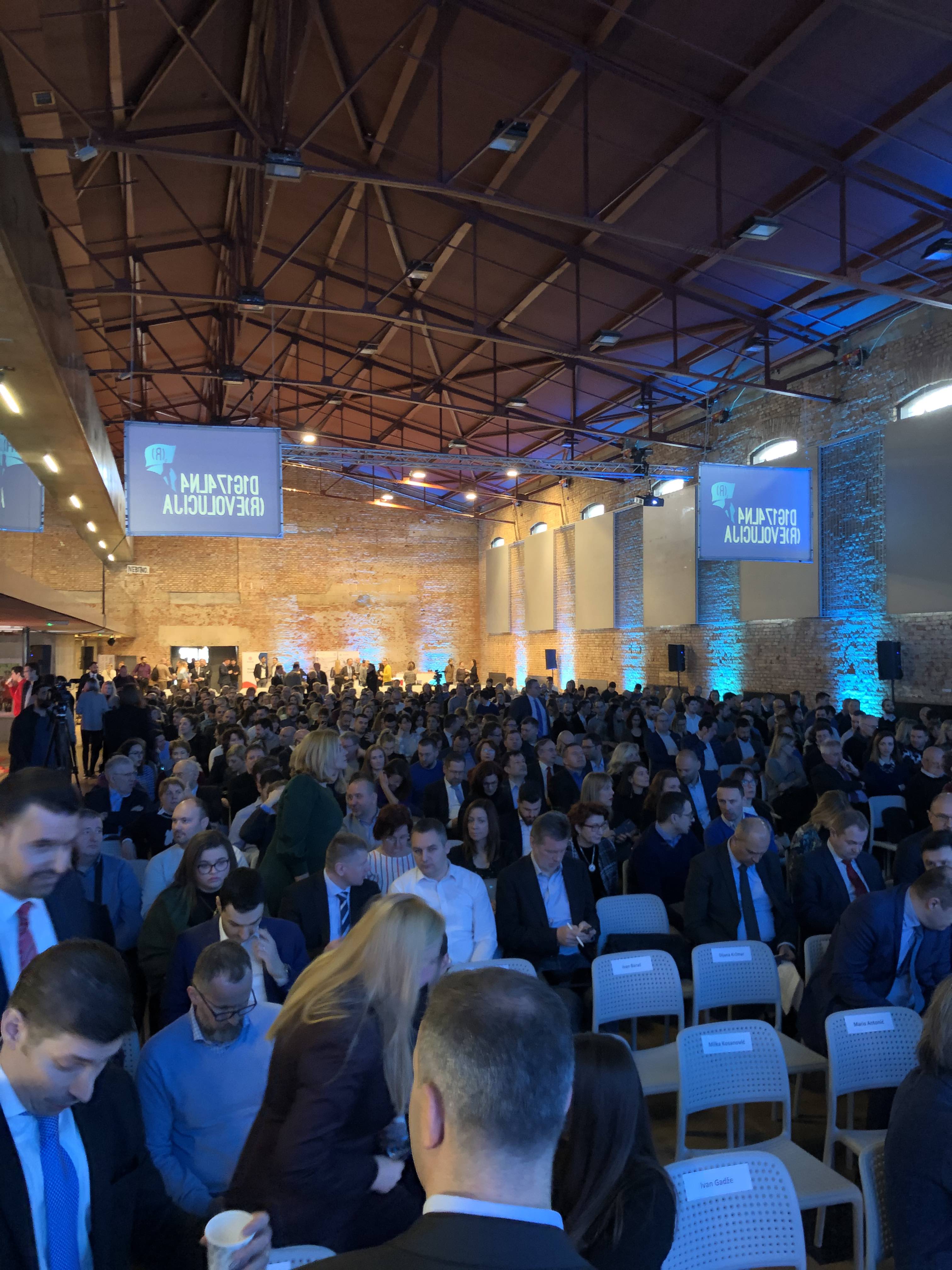
Last January, Estonia passed a bill allowing digital nomads (or remote workers) to come to Estonia and work from there. Could that be something Croatia can replicate soon? Read more into the topic of Digital nomads in Paul's article:
"How Croatia is Becoming Increasingly Attractive for the Digital Nomad Lifestyle"
Croatia: Dubrovnik Police Rescue 36 Migrants on Inflatable Dinghy in Aegean
During surveillance of the European Union's maritime border with Turkey, as part of the Frontex Poseidon mission, four naval officers from Dubrovnik, Croatia rescued 36 migrants from an unmanned dinghy in the Aegean Sea on February 10, according to Dubrovnik police who were monitoring the area.
A migrant dinghy was observed in the area from the Evros (Marica) river delta heading toward Makri, Greece. Cries were heard from the small inflatable vessel, and officers immediately came to the rescue.
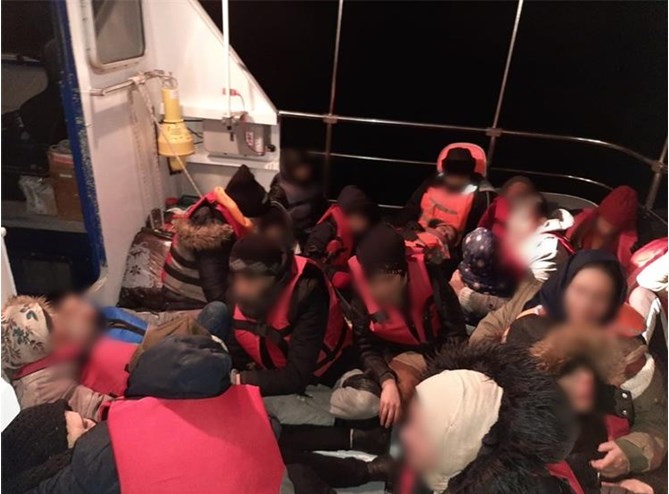
Croatia Police: Migrants on Dinghy Chilled, Dehydrated, Unconscious
"They found 36 foreign nationals on the dinghy, including five children, 11 women and 20 men. All were in poor health: chilled, dehydrated and some were unconscious. The inflatable had run out of fuel and the sea temperature where they were found was only 2 degrees Celsius. It is difficult to say what might have happened to them had they not been rescued,” the Dubrovnik-Neretva Police Department pointed out.
The migrants were transported to a police vessel where officers provided them with water, hot drinks and thermal foil to warm them, after which they were transported to the port of Alexandropolis. They were met there and put under the care of the Emergency Medical Service according to Index on February 14, 2020.
"Out of the 36 migrants, five were hospitalized, while the rest, after receiving medical assistance, were transported to a reception center following further treatment in accordance with national and European legislation," the Dubrovnik police added.
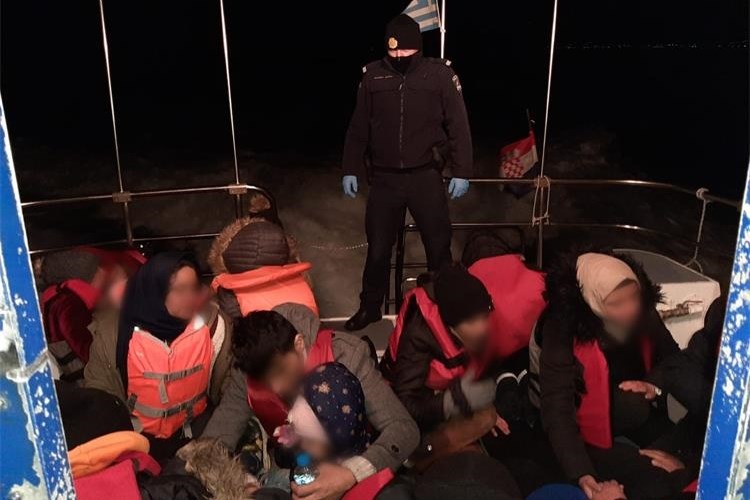
Greece Reports 60,000 Migrant Arrivals in 2019, 4,100 Arrivals in 2020
Following more than 60,000 arrivals last year, more than 4,100 refugees and migrants have reached Greek shores so far in 2020.
Recently, the Croatian parliamentary Committee on Home Affairs and National Security unanimously decided to conduct direct oversight of Croatian police work following complaints about the police treatment of migrants, Committee Chairman Ranko Ostojić (SDP) told the press after the committee meeting on February 6, 2020.
An archive of Total Croatia News coverage on the migrant crisis in Croatia can be accessed here.
Is It Time to Start Putting the Community Back into Tourism?
February 14, 2020 - Long-standing relationships between hosts and guests used to be a hallmark of tourism on the Adriatic. Is it time to bring back the relationship between tourism and the community?
A few years ago, I was contacted by an Englishman living in Samobor requesting a meeting about promoting a project he was involved in.
We met in Zagreb and soon realised that we had a love of one thing in common - Jelsa, that lovely little town on Hvar that I then called home. As the drinks flowed, it became apparent that our joint love was a bit more personal.
He went on to explain that for more than 15 years, he had holidayed at the same apartment with his wife, a lovely spot with a gorgeous view overlooking the Adriatic, with the most exceptional hosts, Franko and Zorica. They watched Franko and Zorica's four kids grow up, and the relationship built up between the two families became almost as important as the holiday itself.
And then one day, sadly, the relationship ended.
Apparently, because of me.
HIs hosts of many years informed his that their daughter was moving into the apartment with her English fiancee, and it would no longer be available for renting. And here we were, in a pub in Zagreb, meeting each ofher for the first time almost 15 years later.
It wasn't the first such strong bond I came across between people I met, who had been guests of my in-laws. A Belgian guy told me about his family holidays in Jelsa which were the highlight of his childhood, until his mother tragically died when he was about 8. We did a feature story on his new business some time ago and included a photo of his mother. When my mother-in-law saw the article, she reproduced exactly the same photo of his mother, along with letters that were exchanged between the families in between visits.
When I first moved to Jelsa, these relationships were the norm, not the exception, and I would often learn interesting and fun facts about my future wife and her family, who had known them for decades.
That was then. This is now.
While it is undoubtedly true that such relationships continue to exist, they are only a fraction of what they used to be. With the surge in private accommodation, as well as Internet booking, often tourists do not even meet their hosts, accessing their accommodation via keypads and the like. It is a fundamental shift in the tourism experience, which is a little regrettable if understandable. Modern tourism has moved on to the Instagram pose and seeing as many places without actually taking the time to enjoy the experience.
I was reminded of all this in a meeting about a digital nomad project we are engaged in, where I was talking to co-working specialist Tanja Polegubic from Saltwater Split.
"Digital nomads love the idea of a home-cooked meal, a simple but fantastic experience."
Imagine grandma making her best sarma for 8 nomads. A really authentic experience for which they would probably pay less than in a restaurant, and some money would go into grandma's pocket.
It got me thinking to some of my most memorable travel experiences all over the globe, and that interaction with the community was the runaway winner in my memories. Experiences like being invited into the home of an Afghan refugee in southern Iran for lunch and a game of chess, that kind of thing.
When I first arrived in Jelsa for that initial weekend in peak season August 2002, we went to an accommodation agency to find a place to stay. One phone call later, and two 5-year-old girls turned up to take us to Grandma's apartment. They sat on our knees in our car as they guided us through the back streets. Grandma was waiting with a welcome rakija and a chat. These are the only memories I have of my stay that first night. About the accommodation itself - nothing.
The concept of tourism and community is under attack from overtourism in general, but I wonder if a little more attention and initiatives to strengthen the relationship between tourism and the community might yield a better tourism experience for both sides, as well as reigniting that loyalty which was the hallmark of tourism here.
After all, Grandma's sarma is hard to beat.
Coronavirus Shuts Down Chinese Factory Supplying Croatia Peljesac Bridge
The Pelješki most (Pelješac Bridge) might be the first victim of the coronavirus in Croatia. The Chinese factory which is building the steel structures for the bridge is temporarily closing. Fortunately, the virus has not yet reached Croatia.
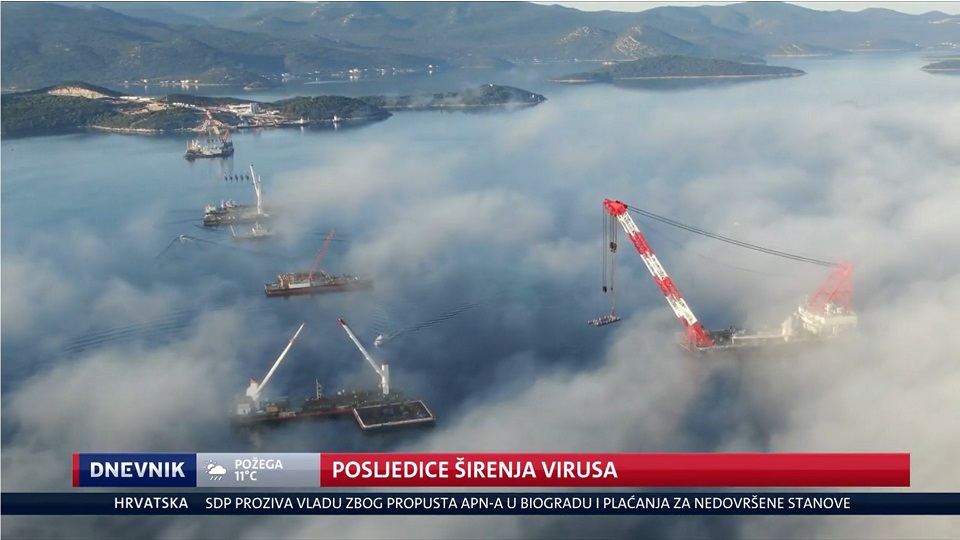
Coronavirus Closes Chinese Steel Structure Factory
The virus has paralyzed China, and that now includes the factory where steel structures are being made for the Pelješki most, according to Vibor Vlainić/Dnevnik on February 13, 2020. This does not mean that work on the bridge will cease in Croatia, but the question remains what will happen when the time comes to install these new structures.
Will the steel structures arrive in Croatia on time? Hrvatske autoceste (Croatian Roads) indicated that the contractor has not asked for an extension. The bridge is scheduled to open on July 31, 2021.
"The contractor (China Road and Bridge Corporation) has taken all the necessary measures, first and foremost, to prevent a potential (coronavirus) health threat to the construction site. They have implemented protective measures at the site and these measures are being enacted according to clear guidelines," HAC reported.
However, Hrvatske autoceste will not be able to send supervisory engineers to the factory in China due to the rapid spread of the infection in that country.
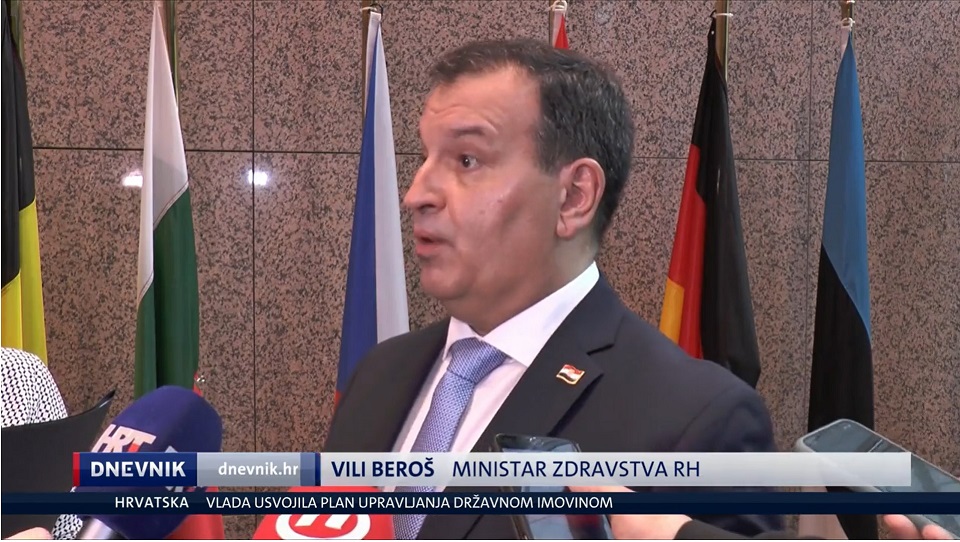
EU Heath Ministers Meeting: Croatia Will Not Close Borders
Due to the danger of the virus, a meeting of health ministers of all EU member states was held in Brussels at the invitation of the Croatian Presidency.
Although several countries have imposed entry restrictions on passengers who have been in China; Croatia has not yet followed suit. Two Chinese tourists have reported to Croatian hospitals with upper respiratory infections this past month: one in Pula and one in Split. Both tested negative for the coronavirus.
"We are not claiming to be absolutely certain (in our approach) but are taking caution. Everyone is asking about closing the Croatian borders, but that is not presently a realistic option. If the situation escalates; of course, we will consider additional factors. That is the most constructive approach for this situation, because emergency situations require extraordinary measures," explained Health Minister Vili Beroš.
At the meeting, several countries requested that each passenger coming from a country with confirmed coronavirus cases list each person with whom they have been in contact upon their entry to the European Union. But they eventually arrived at a compromise.
"It is certain that any person would be able to list all the contacts they have had, but it is expected that someone would answer whether they have had contact with people who have showed signs of illness, cough or fever or have been ill," Beroš added.
Daily updates on the coronavirus can be found here. An archive of Total Croatia News articles on the coronavirus can be accessed here.
TCN Interns: 3 Months of Learning, National and International Exposure
February 14, 2020 - A new direction for Total Croatia News 3 months ago, as three TCN interns joined the team from the Faculty of Political Science and Journalism at Zagreb University. It has been busy!
A few months ago, I was invited to give a seminar of how to run a news portal in Croatia to students at Zagreb University. I was delighted to accept the invitation even if I have not yet worked out how to successfully run a portal in The Beautiful Croatia.
It was a fun event, and the students who braved the early morning 9am start were very engaged - you can see the seminar in the videos below.
An idea came to mind during the seminar - to offer some kind of programme for TCN interns, if there was any interest. Like most things in life, I had no idea what I was doing or any concrete plan, but when three of the attendees enrolled in the programme, I knew I had to come up with something.
It has been an interesting journey for all of us, especially our TCN interns, Ana Samodol, Paula Anic, and Janja Sestak. You can meet them all here.
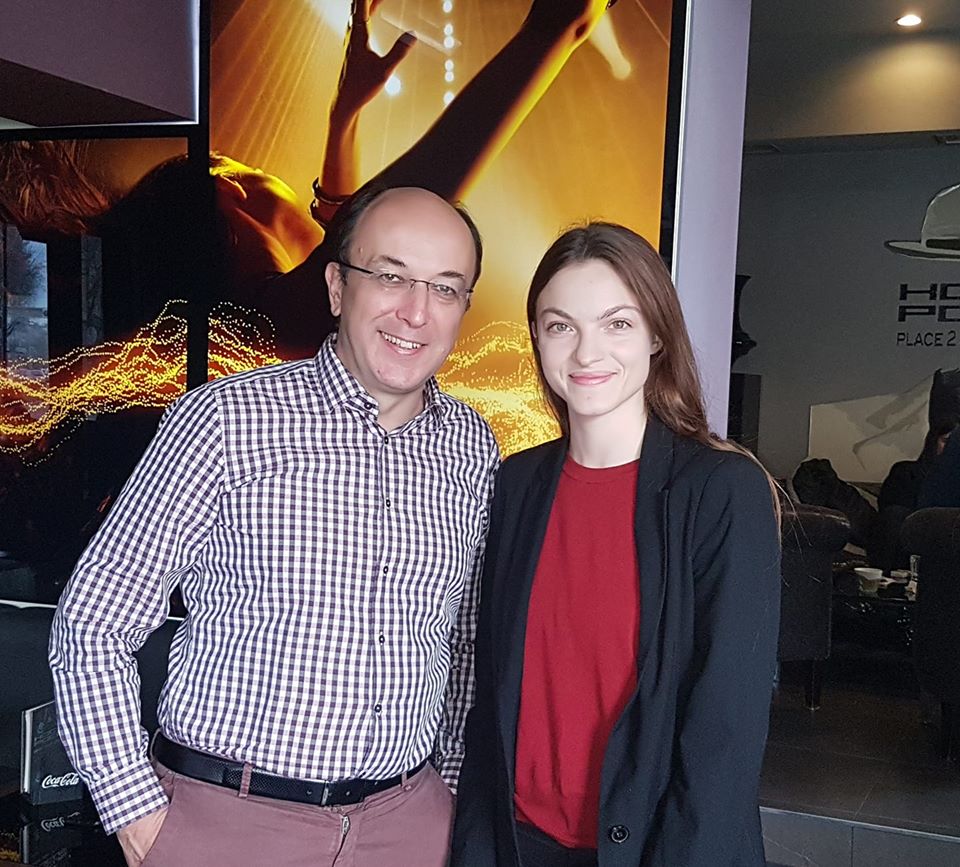
One of the things I like most about working with the business community in Croatia is learning how much many of its top performers are willing to give back, and I had no hesitation in contact some of them to enlist their help as mentors to our new young heroines. First up, PR guru, Kresimir Macan, former Communications Director to Prime Minister Plenkovic, who kindly met with Paula to discuss her passion for politics, and has been giving ongoing advice and support.
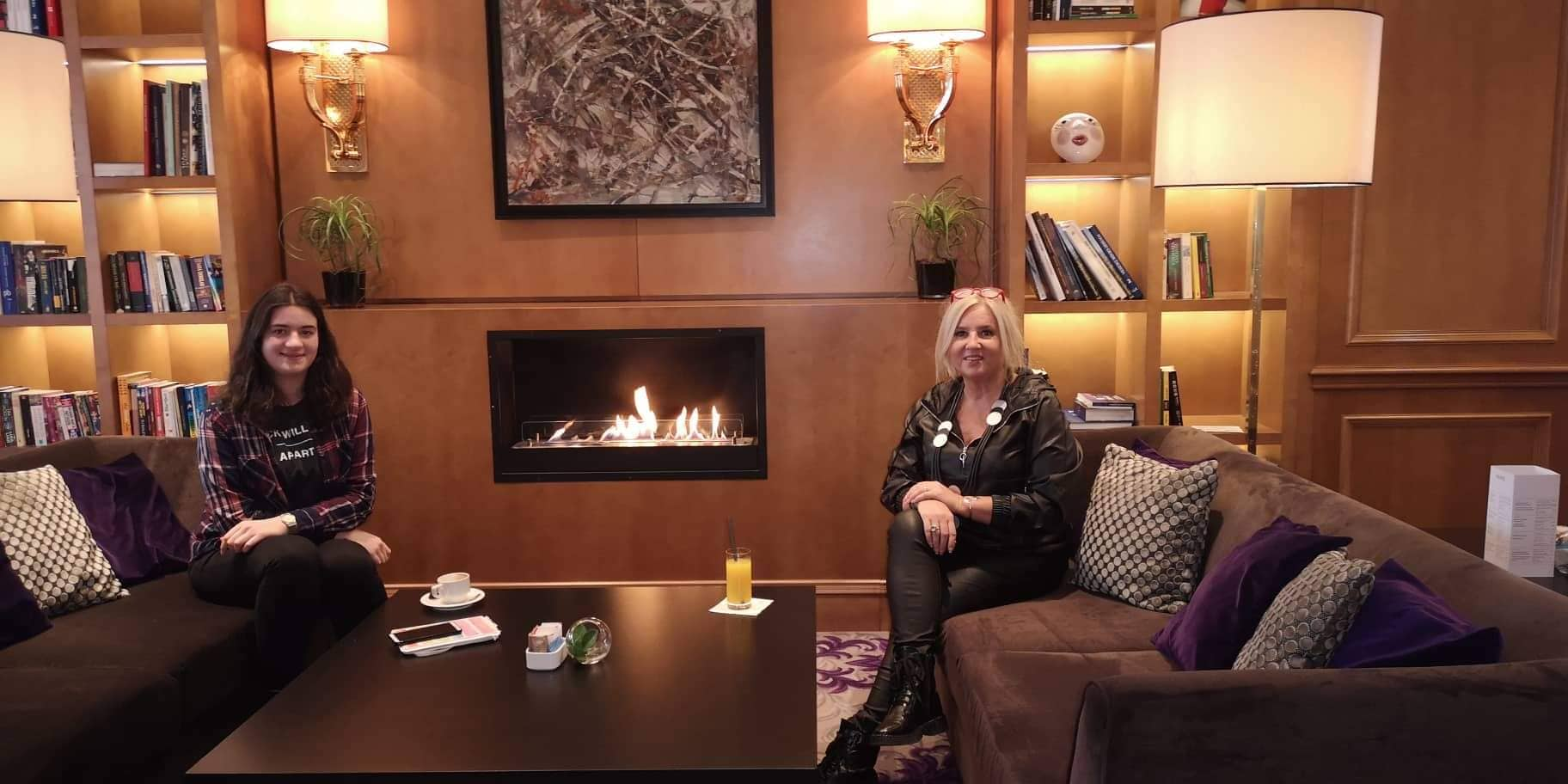
Award-winning documentary-maker and director of the Zagreb Tour Film Festival, the legendica that is Spomenka Saraga, found time to discuss their shared passion for film with Ana - interview coming soon on TCN.
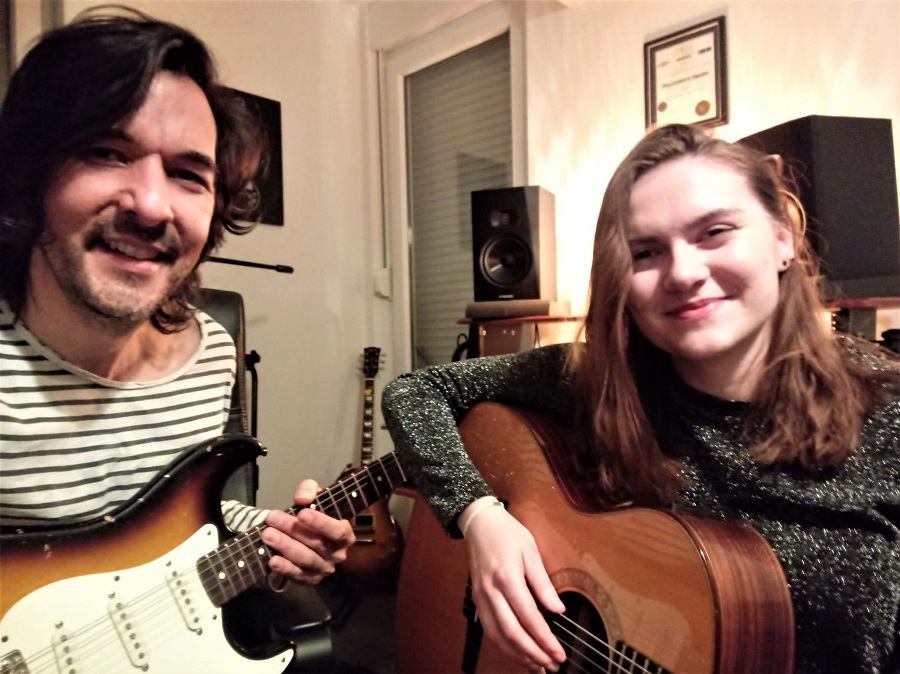
And Janja got to hang out with guitar virtuoso Yogi Lonich ahead of the release of his new album - you can read Yogi's interview here.
I well remember the feeling of having my first article published online back on October 28, 2010 - Driving in Albania: Not for the Fainthearted. It is a really satisfying feeling, watching how complete strangers read - and like - your work. Among the fans who shared Ana's first piece was Sibenik Mayor, Zeljko Buric. Thank you, Sir!
It took me 50 years to get published in the UK with my piece in The Daily Telegraph last year, but Paula managed to get a byline in a London political website within a month of starting with TCN. Apologies for the title, one which was decided in London against our advice.
And Janja has had some great success, most notably in her recent feature on a young bladesmith in Koprivinica.
One of the tips I passed on was the need to work on the promotion of the articles, and so Janja followed my advice and sent it to the relevant portals. And the town of Koprivnica was quick in recognising the talents of bladesmith Ivan Mlinar.
And then regional television got involved.
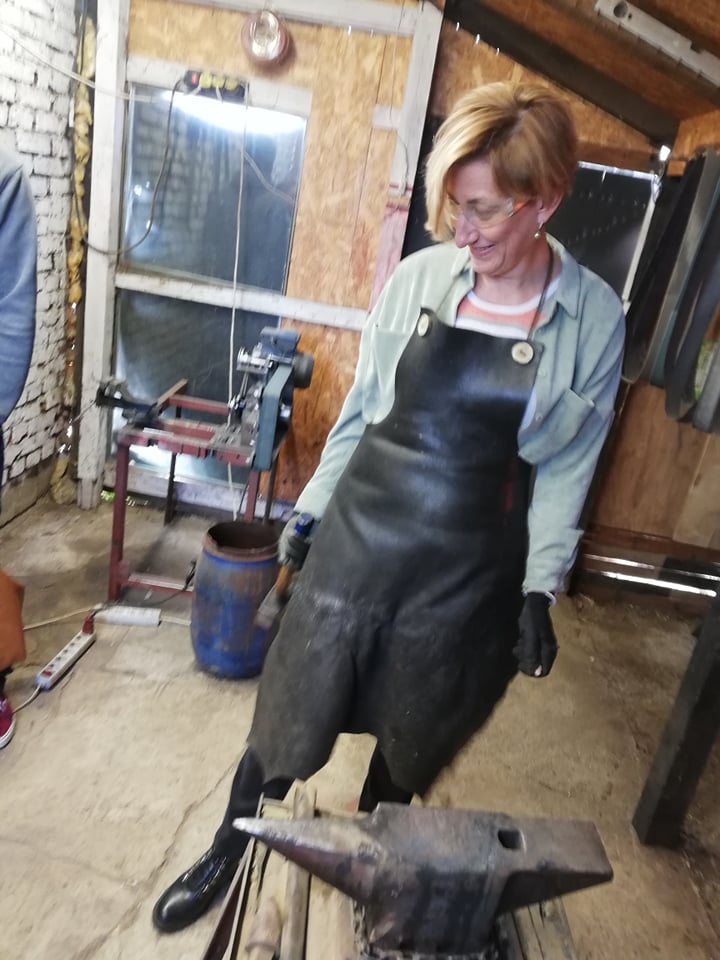
And then national television - here is HRT filming with Ivan yesterday. And with Jutarnji List also in contact, it seems that Janja's article (topic and research 100% her own idea and work) is going truly national. Fantastic job.
We are still finding our feet in the TCN Interns programme, and there isa a big Instagram initiative with our three young ladies starting soon, but a very solid start and congratulations from all three on a very solid start. I asked them how they are enjoying the programme so far.
Ana - I love the opportunities which TCN gives me. What I like the most is that I don't have the pressure of writing things in which I am not interested. I can write about things that are in my interest, and if I don't have any inspiration, Paul encourages me to think about it. Also, I like that there is this easy atmosphere where you can decide when you want your deadline to be. Furthermore, I like that we meet new people, interview them and write about cultural and historical things. The next great thing is that at every meeting we discuss our topics. But not only that, we even talk about how we spend our day and what's new in our lives. I like that we can joke around at those meetings and tell some interesting funny stories. You don't feel like you are on some important business meeting but relaxed talk with your friends.
Janja - When I first applied for TCN, I wasn't aware where exactly this journey will lead me. I'm not sure even now, but I am enjoying the path. I love the opportunities which TCN is continuously giving to us. I like the freedom of choosing my own articles and also seeing that Paul is encouraging us to do so. One of the brilliant things is how easy you can reach the person you want to talk to or go to an event you want to cover. Also, a relaxed atmosphere, quality humor, and understanding people are wonderful things to have around. It is a pretty rare thing to find, especially in a working environment. We are just a few months into this internship and have already had so many positive experiences, so I am very happy.
Paula - Working for the TCN this past three months has opened my eyes about journalism more than my Faculty has in almost 2 years. Working with real deadlines, writing what interests me and constant input from Paul on how to become even better are just some of the things I am grateful for. I would definitely highlight being published in London political portal 'The Article' as one of the best things that have happened in my work thus far. Thank you once again to both Paul and Krešimir Macan. In addition, even though we only just started, I can see that working with Gustavo and Andreas will push me even further out of my comfort zone. What this internship taught me is that it's worth getting up to attend a lecture at 9am. You never know what amazing opportunities might be thrown at you.
TCN is looking to expand its internship programme, as well begin an Instagram video programme with training. If you are interested in applying, please contact This email address is being protected from spambots. You need JavaScript enabled to view it. Subject Intern. For the Instagram programme, you can be anywhere in Croatia and not necessarily a student.


